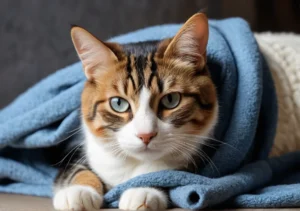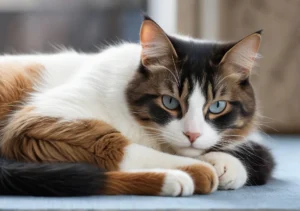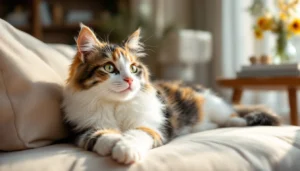Cats, beloved companions and mysterious creatures, have a tendency to claw when they lay on you. This behavior can be a source of both comfort and confusion for cat owners. Why do they do it? Let’s explore the reasons behind this common feline habit.
Have you ever wondered why your cat insists on kneading and clawing at you when they cuddle up for a nap? The answer lies in their instinctual behavior and a few key reasons that explain this quirky habit. Let’s take a closer look at why cats claw when they lay on you.
1. Territorial Instincts
Cats have a natural instinct to mark their territory, which is why they claw when they lay on you. By kneading and clawing at you, they are depositing their scent from the scent glands in their paw pads, claiming you as their own. This behavior is a way for them to establish ownership and feel secure in their environment. So, next time your feline friend starts kneading on you, remember that they are just showing their territorial instincts and love for you.
2. Comfort and Contentment
Another reason why cats claw when they lay on you is for comfort and contentment. The rhythmic motion of kneading can be soothing for cats and mimics the kneading they did as kittens to stimulate milk flow from their mother. It’s a behavior that brings them back to a time of safety and warmth. So, when your cat claws at you while lounging on your lap, it’s a sign that they are feeling happy and relaxed in your presence.
By understanding these reasons behind why cats claw when they lay on you, you can better appreciate and connect with your feline companion. It’s a natural behavior rooted in their instincts and past experiences, showing their affection and trust in you. So, the next time your cat starts kneading on you, embrace it as a loving gesture from your furry friend.
3. Stretching and Relaxation
Cats are natural stretchers, and when they claw at you while lying down, they are not only marking you with their scent but also stretching out their muscles. This behavior helps them get comfortable for a restful nap, allowing them to fully relax and unwind. So, next time your feline friend kneads on you, know that they are just preparing themselves for a well-deserved catnap.
4. Bonding and Affection
When your cat claws and kneads while curled up on your lap, it’s a special moment of bonding and affection. This is their way of showing love and trust towards you, their human companion. By engaging in this behavior, cats are expressing their affection and strengthening the bond they share with you. It’s a comforting ritual that showcases their deep connection to you as part of their family.
Additional Unique Insight:
Interestingly, this behavior can be traced back to kittenhood when kittens knead their mother to stimulate milk flow while nursing. So, when your cat claws and kneads on you, it’s not just a sign of affection but also a reminiscent action from their earliest days of comfort and care.
Remember to cherish these moments of bonding and relaxation with your furry friend, as they add a touch of warmth and love to your relationship with your cat.
5. Playfulness and Stimulation
Cats can be quite playful creatures, and sometimes when they claw at you while laying on you, it may simply be their way of engaging with you and seeking stimulation. Similar to how they might playfully bat at a toy or chase after a moving object, kneading and clawing at you could be their way of interacting and having fun.
6. Seeking Warmth and Comfort
Cats are known for their love of warmth and coziness, which is why they may knead and claw at you when they lay on you. By kneading, they are trying to create a comfortable spot to rest, utilizing your body heat and softness to make the perfect napping spot.
7. Bonding and Marking Territory
In addition to playfulness and seeking warmth, cats may also claw at you when they lay on you as a way of bonding and marking their territory. Cats have scent glands located in their paws, so kneading and clawing could be a way for them to leave their scent on you, marking you as part of their domain. This behavior can also be a sign of affection and a way for them to feel close to you.
Remember, each cat is unique, so observe your feline friend’s behavior to better understand their reasons for clawing when they lay on you.
7. Health and Well-being
If your cat is constantly clawing and kneading when they lay on you, it could be a sign that they are feeling stressed or uncomfortable. Cats may exhibit this behavior as a way to self-soothe in times of anxiety or distress. It’s essential to pay attention to your cat’s body language and overall behavior to determine if there are any underlying health issues causing this behavior. Consulting with a vet can help rule out any medical concerns and provide guidance on how to alleviate your cat’s stress.
8. Training and Discouraging Behavior
In cases where your cat’s clawing becomes excessive or problematic, it’s crucial to implement training techniques to redirect this behavior in a positive direction. Providing appropriate scratching posts and toys can help satisfy your cat’s urge to claw while keeping your furniture safe. Additionally, using deterrents like double-sided tape or citrus sprays on areas where your cat likes to claw can help discourage this behavior. Consistent training and positive reinforcement can go a long way in modifying your cat’s behavior and promoting healthier habits.
By understanding your cat’s behavior and addressing any issues related to clawing when they lay on you, you can nurture a stronger bond with your pet and create a more harmonious living environment. Remember, patience and consistency are key when it comes to training your cat and encouraging positive behaviors. Enjoy the cuddles and quirks of your feline friend while ensuring their well-being and happiness are a top priority.
Alex, a passionate animal lover, has experience in training and understanding animal behavior. As a proud pet parent to two dogs and three cats, he founded AnimalReport.net to share insights from animal experts and expand his knowledge of the animal kingdom.




